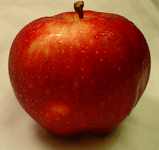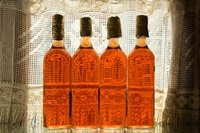 and a slightly downy underside. Flowers are produced in spring simultaneous with the budding of the leaves. The flowers are white with a pink tinge that gradually fades, five petaled, 2.5–3.5 cm in diameter. The fruit matures in autumn, and is typically 5–9 cm diameter. The centre of the fruit contains five carpels arranged in a five-point star, each carpel containing one to three seeds.
and a slightly downy underside. Flowers are produced in spring simultaneous with the budding of the leaves. The flowers are white with a pink tinge that gradually fades, five petaled, 2.5–3.5 cm in diameter. The fruit matures in autumn, and is typically 5–9 cm diameter. The centre of the fruit contains five carpels arranged in a five-point star, each carpel containing one to three seeds.Botanical Information
The wild ancestor of Malus domestica is Malus sieversii. It has no common name in English, but is known in Kazakhstan, where it is native, as alma; in fact, the region where it is thought to originate is called Almaty, or "reach of the apples". This tree is still found wild in the mountains of Central Asia in southern Kazakhstan, Kyrgyzstan, Tajikistan, and Xinjiang, China.

For many years, there was a debate about whether M. domestica evolved from chance hybridization among various wild species. Recent DNA analysis by Barrie Juniper, Emeritus Fellow in the Department of Plant Sciences at Oxford University and others, has indicated, however, that the hybridization theory is probably false. Instead, it appears that a single species still growing in the Ili Valley, on the northern slopes of the Tien Shan mountains at the border of Northwest China and Kazakhstan, is the progenitor of the apples eaten today. Leaves taken from trees in this area were analyzed for DNA composition, which showed them all to belo
 ng to the species M. sieversii, with some genetic sequences common to M. domestica. Other species that were previously thought to have made contributions to the genome of the domestic apples are Malus baccata and Malus sylvestris, but there is no hard evidence for this in older apple cultivars. These and other Malus species have been used in some recent breeding programmes to develop apples suitable for growing in climates unsuitable for M. domestica, mainly for increased cold tolerance.
ng to the species M. sieversii, with some genetic sequences common to M. domestica. Other species that were previously thought to have made contributions to the genome of the domestic apples are Malus baccata and Malus sylvestris, but there is no hard evidence for this in older apple cultivars. These and other Malus species have been used in some recent breeding programmes to develop apples suitable for growing in climates unsuitable for M. domestica, mainly for increased cold tolerance.History
Cultural Aspects
Germanic paganism
In Norse mythology, the goddess Iðunn is portrayed in the Prose Edda (written in the 13th century by Snorri Sturluson) as providing apples to the gods that give them eternal youthfulness. English scholar H. R. Ellis Davidson links apples to religious practices in Germanic paganism, from which Norse paganism developed. She points out that buckets of apples were found in the Oseberg ship burial site in Norway and that fruit and nuts (Iðunn having been described as being transformed into a nut in Skáldskaparmál) have been found in the early graves of the Germanic peoples in England and elsewhere on the continent of Europe which may have had a symbolic meaning, and that nuts are still a recognized symbol of fertility in Southwest England.

Davidson notes a connection between apples and the Vanir, a tribe of gods associated with fertility in Norse mythology, citing an instance of eleven "golden apples" being given to woo the beautiful Gerðr by Skírnir, who was acting as messenger for the major Vanir god Freyr in stanzas 19 and 20 of Skírnismál. Davidson also notes a further connection between fertility and apples in Norse mythology in chapter 2 of the Völsunga saga when the major goddess Frigg sends King Rerir an apple after he prays to Odin for a child, Frigg's messenger (in the guise of a crow) drops the apple in his lap as he sits atop a mound. Rerir's wife's consumption of the apple results in a six-year pregnancy and the caesarean section birth of their son - the hero Volsung.
Further, Davidson points out the "strange" phrase "Apples of Hel" used in an 11th century poem by the skald Thorbiorn Brúnarson, she states this may imply that the apple was thought of by the skald as the food of the dead. Further, Davidson notes that the potentially Germanic goddess Nehalennia is sometimes depicted with apples and that parallels exist in early Irish stories. Davidson asserts that while cultivation of the apple in Northern Europe extends back to at least the time of the Roman Empire and came to Europe from the Near East, the native varieties of apple trees growing in Northern Europe are small and bitter. Davidson concludes that in the figure of Iðunn "we must have a dim reflection of an old symbol: that of the guardian goddess of the life-giving fruit of the other world."
Greek mythology
Apples appear in many religious traditions, often as a mystical or forbidden fruit. One of the problems identifying apples in religion, mythology and folktales is that the word "apple" was used as a generic term for all (foreign) fruit, other than berries but including nuts, as late as the 17th C. CE. For instance, in Greek mythology, the Greek hero Heracles, as a part of his Twelve Labours, was required to travel to the Garden of the Hesperides and pick the golden apples off the Tree of Life growing at its center.
 The Greek goddess of discord, Eris, became disgruntled after she was excluded from the wedding of Peleus and Thetis. In retaliation, she tossed a golden apple inscribed Καλλιστή (Kalliste, sometimes transliterated Kallisti, 'For the most beautiful one'), into the wedding party. Three goddesses claimed the apple: Hera, Athena, and Aphrodite. Paris of Troy was appointed to select the recipient. After being bribed by both Hera and Athena, Aphrodite tempted him with the most beautiful woman in the world, Helen of Sparta. He awarded the apple to Aphrodite, thus indirectly causing the Trojan War.
The Greek goddess of discord, Eris, became disgruntled after she was excluded from the wedding of Peleus and Thetis. In retaliation, she tossed a golden apple inscribed Καλλιστή (Kalliste, sometimes transliterated Kallisti, 'For the most beautiful one'), into the wedding party. Three goddesses claimed the apple: Hera, Athena, and Aphrodite. Paris of Troy was appointed to select the recipient. After being bribed by both Hera and Athena, Aphrodite tempted him with the most beautiful woman in the world, Helen of Sparta. He awarded the apple to Aphrodite, thus indirectly causing the Trojan War.Atalanta, also of Greek mythology, raced all her suitors in an attempt to avoid marriage. She outran all but Hippomenes (a.k.a. Melanion, a name possibly derived from melon the Greek word for both "apple" and fruit in general), who defeated her by cunning, not speed. Hippomenes knew that he could not win in a fair race, so he used three golden apples (gifts of Aphrodite, the goddess of love) to distract Atalanta. It took all three apples and all of his speed, but Hippomenes was finally successful, winning the race and Atalanta's hand.
Christianity
Though the forbidden fruit in the Book of Genesis is not identified, popular Christian tradition has held that it was an apple that Eve coaxed Adam to share with her. This may have been the result of Renaissance painters adding elements of Greek mythology into biblical scenes. In this case the unnamed fruit of Eden became an apple under the influence of story of the golden apples in the Garden of Hesperides. As a result, in the story of Adam and Eve the apple became a symbol for knowledge, immortality, temptation, the fall of man into sin, and
 sin itself. In Latin, the words for "apple" and for "evil" are similar in the singular (malus—apple, malum—evil) and identical in the plural (mala). This may also have influenced the apple becoming interpreted as the biblical "forbidden fruit". The larynx in the human throat has been called Adam's apple because of a notion that it was caused by the forbidden fruit sticking in the throat of Adam. The apple as symbol of sexual seduction has been used to imply sexuality between men, possibly in an ironic vein. The idea of an apple being the fruit of the Tree of the Knowledge of Good and Evil with English speakers may have been helped by the fact that apple could also be a generic word for fruit in Old English, the word being used in various commentaries on Genesis.
sin itself. In Latin, the words for "apple" and for "evil" are similar in the singular (malus—apple, malum—evil) and identical in the plural (mala). This may also have influenced the apple becoming interpreted as the biblical "forbidden fruit". The larynx in the human throat has been called Adam's apple because of a notion that it was caused by the forbidden fruit sticking in the throat of Adam. The apple as symbol of sexual seduction has been used to imply sexuality between men, possibly in an ironic vein. The idea of an apple being the fruit of the Tree of the Knowledge of Good and Evil with English speakers may have been helped by the fact that apple could also be a generic word for fruit in Old English, the word being used in various commentaries on Genesis.









